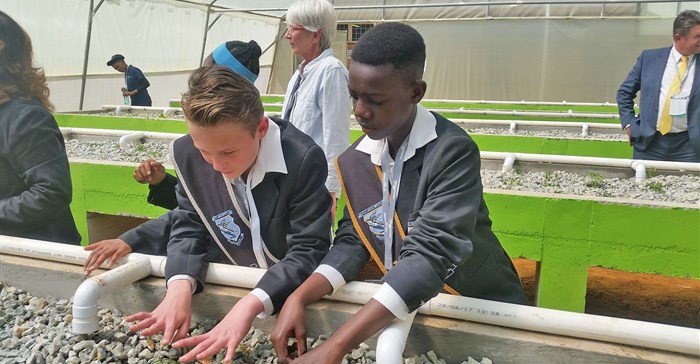Kempton Park Primary School students have planted seedlings in their new aquaponics garden launched by InMed Partnerships for Children, InMed South Africa and Air Products South Africa.

Students plant seedlings in their new aquaponics garden at Laerskool Kempton Park, which was installed by INMED South Africa and Air Products South Africa in Johannesburg.
Innovative food production, improved nutrition and food security for children
Aquaponics is an innovative food production technique that combines aquaculture (fish farming) with hydroponics (soilless crop production in water) in a closed symbiotic system. “InMed has pioneered the use of school-based aquaponics to improve the nutrition and food security of children in disadvantaged communities in South Africa for more than 10 years,” says Dr. Linda Pfeiffer, president and CEO of InMed Partnerships for Children.
“Air Products was our first - and has been our most consistent - partner to expand aquaponics to primary and secondary schools.”
Advantages of aquaponics include crop production at least five times higher than traditionally farmed plots of equivalent size, 85-90% less water consumption than traditional irrigation, low energy consumption, and year-round crop production. Schools use the vegetables, herbs, and fish in the children’s meals, and many schools also sell surplus harvests to generate income.
The new aquaponics system at Kempton Park Primary School, a full-service primary school that also accommodates the needs of children with disabilities, is the third such school-based system InMed Partnerships for Children and Inmed South Africa have installed in partnership with Air Products.
A special sensory garden
“Air Products understands that nutritious meals at school directly affect school performance,” notes Inmed South Africa Operations Manager Janet Ogilvie. “Both InMed and Air Products believe that the future of South Arica is in the hands of today’s kids, and for our country to be a healthy and prosperous place to live, we need to start with developing healthy children.”
In addition to the aquaponics system, InMed will include a more traditional garden - with a twist. Because many of the students at Kempton Park Primary School have a disability or learning challenges, InMed will install a special sensory garden, featuring a barefoot walking path of various textures, water and sound walls, fragrant fruit trees and vines, brightly colored plants and garden toys. Teachers will use the aquaponics system and the sensory garden as teaching tools and therapy for their students. And because aquaponics is not labor intensive and does not use chemicals or fertilisers, the children will assist with the planting and harvesting as well as care and feeding of the fish.
Teachable moments
These teachable moments are at the core of Air Products’ philanthropic endeavors. “Our corporate social investment strategy focuses on the youth and education, and InMed’s program proves to educate learners in a way that is enjoyable and rewarding for the learners,” says Air Products South Africa Managing Director Rob Richardson. “We find the continued partnership extremely rewarding.” Employees from the Air Products facility nearby are already planning future volunteer opportunities around the new garden and aquaponics unit.


































